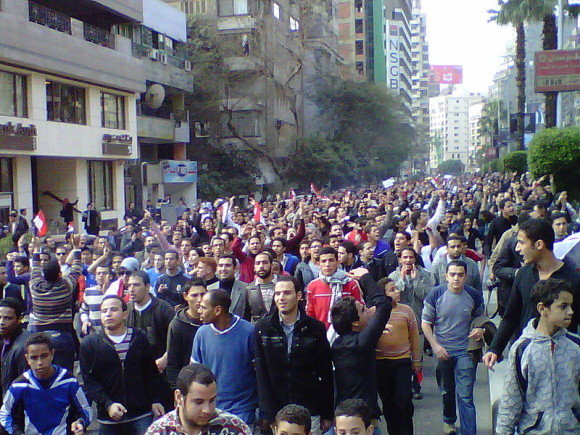Last updated on July 9, 2013
(Note: This is the second of a two-part guest post by Catherine Herrold, a PhD candidate at Duke University whose dissertation looks at the relationship between philanthropic foundations and the Egyptian revolution. The first part was posted on Monday morning.)

The US assumed, incorrectly, that Egypt’s transitional government would allow it to bypass traditional bilateral aid channels and send grants unilaterally to both international and local democracy-promotion NGOs. Instead, the government waged a public war against civil society, placing international NGO employees on trial for meddling in Egyptian politics and instilling fear into Egypt’s own NGO community.
A less public but no less important outcry came from Egypt’s development community. Democracy, they explained, would not be built by promoting elections, funding fancy NGOs, or training budding party leaders in the ways of Western politicians. In fact, democracy was already being built locally around cups of tea and through legan (popular committees) as community members came together for the first time in decades to discuss problems, debate solutions, and set agendas for action. What was needed to sustain this newfound democratic spirit, development leaders interviewed in the course of my research argued, were funds for projects related to education, job training, and health care that simultaneously addressed Egyptians’ basic human security concerns and built their capacities to be engaged democratic citizens.
“Politics Cloaked in Development”
“Bread, freedom, and dignity” were the rallying cries of the January 25th protestors, and democracy promotion programs that overlook the human security element of Egypt’s transition do so at their peril. In the wake of the 2011 revolution, real GDP growth, which averaged 5% from 1992 to 2010, fell to -4.3% directly after the revolution and hovered close to zero throughout 2011. After a spike to 5.2% growth in the first quarter of 2012, GDP growth slowed to just 2.2% in the last quarter of 2012 and first quarter of 2013. In 2012 poverty stood at 25%, unemployment at 13%, illiteracy at 28%, and inequality at a Gini coefficient of 31%. USAID’s “transition awards” for Egypt did not neglect economic development; in fact, $100 million was targeted to grants aimed at easing the impacts of Egypt’s economic decline and building the private sector. But in decoupling grants for economic and political reform, the US invited the wrath of the Egyptian government and the distrust of the Egyptian people.
By contrast, the Egyptian development NGOs included in my study “cloaked politics in development,” adopting a rights-based approach to development that sought to nourish values of political engagement through human empowerment programs related to literacy, health care, and job training. This strategy allowed them to bypass the government law that prohibited “political activities” among NGOs and also helped them to build trust with beneficiaries who sought to chart their own path to political involvement.
In the wake of the Egyptian NGO trial, the US pulled its prominent democracy-promotion NGOs out of Egypt and scaled back its political reform grants. Rather than abandoning the political reform goal, the US would be wise to adopt a more humble and restrained approach, focusing not on installing Western-style democracy in Egypt but instead seeking to support Egyptians as they reclaim their economic, social, and political human rights.